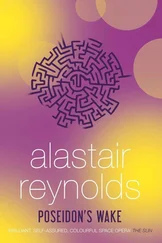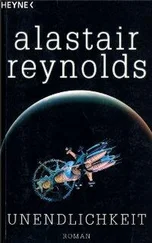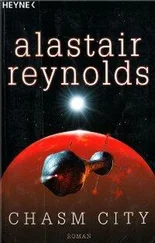He told the Cessna that he would return within two hours, grabbed his shoulder bag from behind the pilot’s seat and then set off in the direction of the herd. Leaving nothing to chance, Geoffrey hefted a dead branch from the ground and used it to beat the earth as he walked, occasionally raising his voice to announce his arrival. The last thing he wanted to do was startle a dozing elephant that had somehow managed not to pick up on his approach.
‘It’s me, Geoffrey.’
He pushed through the trees, and at last the elephants were in sight. Ten, as the aug had confirmed – grazing peacefully, snuffling and rooting through dried-up grass. The matriarch, Matilda, was already aware of his presence. She was a big elephant with a broad face, missing a tusk on the right side and possessed of a distinctive Africa-shaped notch in the side of her left ear.
Geoffrey discarded the stick. ‘Hello, big girl.’
Matilda snorted and threw back her head, then returned to the business of foraging. Geoffrey surveyed the rest of the party, alert for signs of illness, injury or belligerent mood. One of the younger calves – Morgan – still had the same limp Geoffrey had noted the day before, so he voked a specific biomedical summary. Bloodstream analysis showed normal white cell and stress hormone counts, suggesting that there was no infection or skeletal injury, only a moderately debilitating muscle sprain that would clear up with time. Babies were resilient.
As for the rest of the M-family, they were relaxed and peaceable, even Marsha, the daughter who had recently mock-charged Geoffrey. She appeared sheepishly absorbed in her foraging, as if trusting that the incident was something they could both put behind them.
He paused in his approach, framed the view with his fingers like a budding auteur and blinked still frames. Sometimes he even took a small folding chair from the Cessna and sat down with a sketchbook and sharpened 2B pencil, trying to capture the ponderous majesty of these wise and solemn creatures.
‘So, old lady,’ he said quietly as he came nearer to the matriarch, ‘how are things today?’
Matilda eyed him with only mild curiosity, as if he would suffice until something more interesting came along. She continued to probe the ground with her trunk while one of the calves – Meredith’s boy, Mitchell – nosed around her hindquarters, flicking flies away with his tail.
Geoffrey voked the link with Matilda. A graphic of her brain appeared in the upper-left corner of his visual field, sliced through and colour-coded for electrical and chemical activity, all squirming blues and pinks, intricately annotated.
Geoffrey placed his bag on the ground and walked up to Matilda, all the while maintaining an unthreatening posture and letting her see that his hands were empty. She allowed him to touch her. He ran his palm along the wrinkled, leathery skin at the top of her foreleg. He felt the slow in-and-out of her breathing, like a house-sized bellows.
‘Is this the day?’ he asked.
After six months’ careful negotiation he had flown to a clinic in Luanda, on the Angolan coast, and completed the necessary paperwork. The changes to his own aug protocols were all legal and covered by watertight non-disclosure statutes. The new taps had been injected painlessly, migrating to their chosen brain regions without complication. Establishing the neural connections with his own brain tissue took several weeks, as the taps not only bonded with his mind but carried out diagnostic tests on their own functioning.
In the late summer of the previous year he’d had strange machine-like dreams, his head filled with luminous gridlike patterns and insanely complex tapestries of pulsing neon. He’d been warned. Then the taps bedded down, his dreams returned to normal and he felt exactly as he had done before.
Except now there was a bridge in his head, and on the other side of that bridge lay a fabulous, barely charted alien kingdom.
All he had to do was summon the nerve to cross into it.
Geoffrey walked around Matilda once, maintaining hand-to-skin contact so that she always knew where he was. He felt the other elephants studying him, most of them adult enough to know that if Matilda did not consider him a threat, nor should they.
Geoffrey voked his own real-time brain image into position next to Matilda’s. Mild ongoing activity showed in the visual and auditory centres, as she watched him and at the same time kept vigil over the rest of her family. He, on the other hand, was showing the classic neurological indicators of stress and anxiety.
Not that he needed the scan to tell him that: it was there in his throat, in his chest and belly.
‘Show some backbone,’ Geoffrey whispered to himself.
He voked the aug to initiate the transition. A sliding scale showed the degree of linkage, beginning at zero per cent and rising smoothly. At ten per cent there was no detectable change in his mental state. On the very first occasion, six months ago now, he’d reached fifteen and then spooked himself out of the link, convinced that his mind was being slowly infiltrated by tendrils of unaccountable dread. The second time, he’d convinced himself that the dread was entirely of his own making and nothing to do with the overlaying of Matilda’s state of mind. But at twenty per cent he had felt it coming in again, spreading like a terror-black inkblot, and he had killed the link once more. On the five subsequent occasions, he had never taken the link beyond thirty-five per cent.
He thought he could do better this time. There had been sufficient opportunity to chide himself for his earlier failures, to reflect on the family’s quiet disappointment in his endeavours.
As the scale slid past twenty per cent, he felt superhumanly attuned to his surroundings, as if his visual and auditory centres were beginning to approach Matilda’s normal state of activity. Each blade of glass, each midday shadow, appeared imbued with vast potentiality. He wondered how any creature could be that alert and still have room for anything resembling a non-essential thought.
Perhaps the relative amplification levels needed tweaking. What might feel like hyper-alertness to him might be carefree normality to Matilda.
He exceeded twenty-five per cent. His self-image was beginning to lose coherence: it was as if his nerve-endings were pushing through his skin, filling out a volume much larger than that defined by his body. He was still looking at Matilda, but now Matilda was starting to shrink. The visual cues were unchanged – he was still seeing the world through his own eyes – but the part of his brain that dealt in spatial relationships was being swamped by data from Matilda.
This was how he felt to her: like a doll, something easily broken.
Thirty per cent. The spatial adjustment was unsettling, but he could cope with the oddness of it all. It was weird, and it would leave him with the curious appreciation that his entire sense of self was a kind of crude, clunking clockwork open to sabotage and manipulation, but there was no emotional component.
Thirty-five per cent, and the terror hadn’t begun to come in yet. He was nearly four-tenths of the way to thinking like an elephant, and yet he still felt fully in command of his own mental processes. The emotions were the same as those he’d been experiencing when he initiated the link. If Matilda was sending him anything, it wasn’t enough to suppress his own brain activity.
He felt a shiver of exhilaration as the link passed forty per cent. This time, just possibly, he could go all the way. Even to reach the halfway point would be a landmark. Once he had got that far, there would be no doubt in his mind that he could take the link to its limit. Not today, though. Today he’d willingly settle for fifty-five, sixty per cent.
Читать дальше












